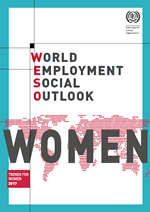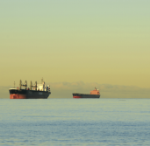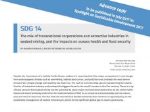Published on Thu, 2017-06-15 21:59
Closing the gender gap by 25 per cent by the year 2025 has the potential to boost global employment by 189 million and raise global GDP in 2025 by 3.9 per cent, or US$5.8 trillion, the International Labour Organisation (ILO) has said. In its World Employment and Social Outlook report released Wednesday, the ILO said that the achievement of such a goal could also unlock large potential tax revenues. For example, global tax revenue could increase by US$1.5 trillion given currently projected government revenue shares in GDP, most of it in emerging (US$990 billion) and developed countries (US$530 billion). "Consequently, policies promoting gender equality could be self-financing," it said. |
Published on Sat, 2017-06-10 08:18
Europe needs to do more to contribute to the 2030 Agenda on Sustainable Development that it supports and helped shape. This is the main conclusion of "From Vision to Action," a book compiling innovative research by young authors on a variety of issues, from taxes to energy, trade, and education. This publication is a first product of the Progressive Lab for Sustainable Development, a joint initiative of the Foundation for European Progressive Studies, the Socialists & Democrats group at the European Parliament and the SOLIDAR network. The Lab argues that the 2030 Agenda "could potentially turn the current unsustainable ‘growth-at-any-cost’ economic model into a sustainable one based on the clear supremacy of human rights over the economic privileges of vested interest groups. This will require measures and policies that tackle the current major global challenges such as growing inequalities; the biased trade and investment strategies and growing corporates’ power; the shrinking funding for development cooperation." |
Published on Fri, 2017-06-09 15:36
Increasing oil and gas production while at the same time trying to reduce carbon emissions are conflicting priorities, argues a joint study by the University of Victoria, the Canadian Centre for Policy Alternatives and the Parkland Institute. The Climate Leadership Plan of the province of Alberta allows to expanding oil sands production by 53 per cent and emissions by 47 per cent above 2014 levels. To compensate and still meet Canada’s Paris Agreement commitments the rest of the Canadian economy should reduce emissions by 47 per cent by 2030. This will be virtually impossible in the time remaining barring an economic collapse. Three new pipelines have been approved in Canada and a fourth (Energy East) is under review even though oil supply forecasts show that not all are needed. This shows, according to the study that "Canada has no energy strategy beyond liquidating its remaining non-renewable resources as fast as possible to serve the economic interests of governments of the day. What we really need is a comprehensive energy strategy that addresses both the future energy security of Canadians and Canada’s commitments on climate change". |
Published on Thu, 2017-06-08 17:08
"Despite the importance of a healthy Pacific Ocean, evidence is mounting that this unique ecosystem is in real danger from anthropogenic threats such as overfishing, habitat destruction, and pollution and probably the most severe threat of all, climate change and resulting sea level rise" argued Maureen Penjueli, from the Pacific Network on Globalization, on occasion of the Ocean Conference that took place from June 5 to 9 at the United Nations in New York. The rush to mine the deep seas is representing the newest frontier of extractive industry and perhaps the biggest threat to the world’s oceans in the 21st century. There is a significant concern that seabed mining has the potential to cause major environmental destruction to the entire Pacific Ocean and would seriously undermine the implementation of SDG 14, to conserve and sustainably use the oceans, seas and marine resources. |
Published on Thu, 2017-06-08 10:36
The United Nations Working Group on business and human rights has urged the Canadian government as well as the business sector to step up their efforts in addressing the adverse human rights impacts of their business activities, both at home and abroad, in particular in the extractives sector and other industries. At the end of its official ten-day visit to the country on 1 June, the UN Working Group on human rights and transnational corporations and other business enterprises also called for meaningful consultation with indigenous peoples in the context of business activities on their lands. |
SUSCRIBE TO OUR NEWSLETTER







